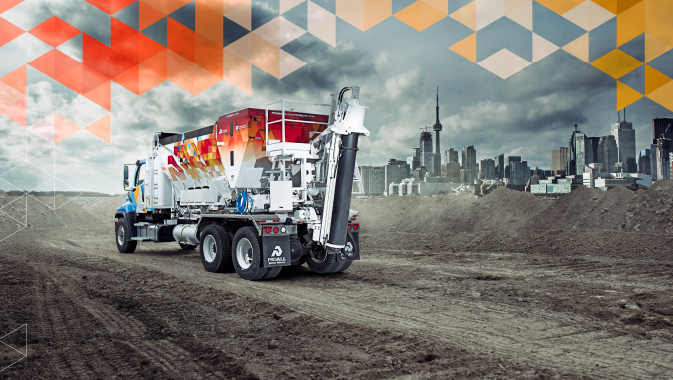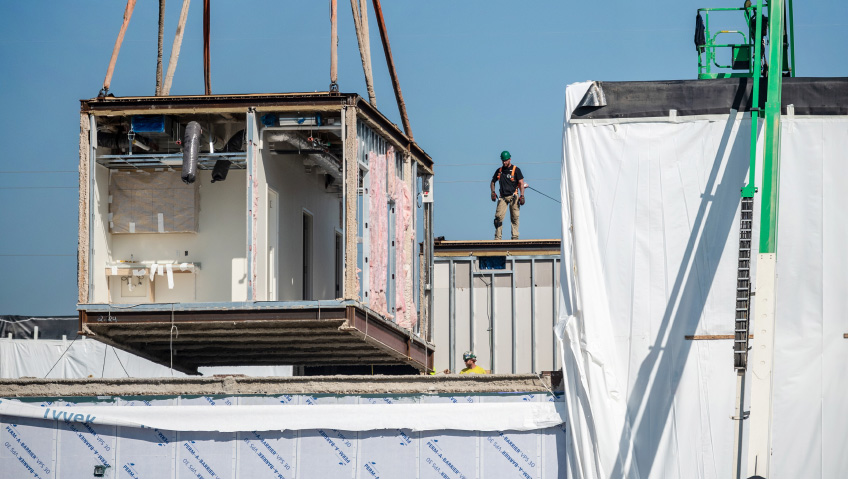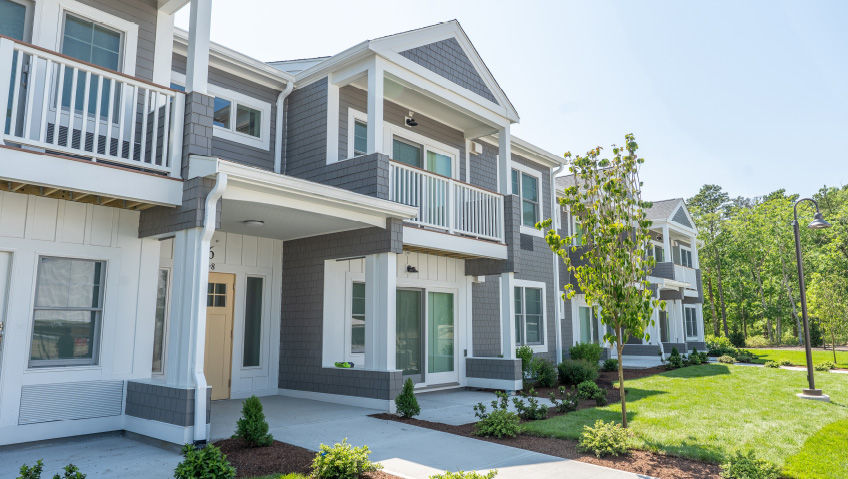There’s a lot to be proud of at ProAll International Manufacturing. Whether it’s utilizing a unique method to pour concrete via specialized mobile concrete mixers, or weathering a global pandemic and emerging stronger than ever, ProAll has demonstrated passion and dedication to providing quality product in a simpler, more convenient delivery, laying a foundation for success and growth for years to come.
Created in 2013 from the merger of two companies — Reimer Alliance International, makers of the Reimer Mixer, an industry leader in volumetric concrete production, and Pro-Ject, formerly Westward Ltd., manufacturers of a variety of agricultural, ranching and lawncare equipment — ProAll’s rich history extends back to 1959 with roots stretching around the globe. Based in Alberta, the company’s new assembly facility boasts top-notch manufacturing, engineering and design capabilities, perfectly positioned to provide mobile concrete mixers in high demand around the world.
ProAll’s numerous achievements in the industry include being the largest supplier of volumetric mixers to the United Kingdom and unveiling the Commander control system in 2016, which revolutionized the industry.
“The Commander control system is an automated system that takes a lot of the operator error out of the equation, due to the automation of things like water:cement ratio which traditionally was controlled by the operator and is now is controlled by an onboard computer,” explains Vice President, Sales and Marketing, Andrew Coates.
Considered both innovative and revolutionary, the Commander control system makes the Reimer Mixer the most high-performance mobile mixer in the world, ensuring consistency through cutting-edge hydraulics and digital controls.
“We’ve done a complete overhaul of our mixers, so even visually, if you were to look at a mixer that we built in 2015 and compare that to a mixer that we built in 2016, they’d look quite different,” says Coates. The company also made a number of upgrades that provided advantages to the bins and the hydraulic system, creating industry-leading results in terms of efficiency.
Last year, ProAll sold eight mixers to the New York City Department of Transportation (NYCDOT) which currently utilizes them for their own internal public works department.
“There’s a lot of concrete poured in NYC, sidewalks and curbing and fenceposts for sign posts, and they’re trying to move toward doing that internally instead of paying private contractors,” shares Coates.
Another successful project involving the use of Reimer Mixers can be found in Mexico City, an area prone to potentially devastating earthquakes. ProAll’s Reimer Mixers were the only equipment capable of performing the challenging task when special earthquake-proof elastic concrete was needed to construct vertical columns of a 25-storey skyscraper, The Torre Glorieta.
Following a massive 1985 earthquake that devastated the region with more than 400 buildings destroyed and 3,100 others damaged, and 9,500 people killed and more than 30,000 injured, the city has been tireless in its attempts to guard against a subsequent quake, utilizing advanced engineering techniques and strict building codes. This means buildings constructed using material other than traditional concrete, which offers less flexibility during a quake.
To combat this, elasticity is needed to absorb impact energy, using a type of concrete known as Class One. But transporting a large amount of this type of concrete to the middle of the highly congested Mexico City provided its own unique challenges, namely time constraints.
“You have two hours with traditional Ready Mix to unload the concrete before it goes stale, and in this situation logistics dictated they wouldn’t be able to use traditional Ready Mix,” Coates explains. The volumetric mixer allowed the driver to set up a sand pile and a stone pile with a cement silo and pour the entire building right on site with one mixer. “That was certainly a standout project for us to see somebody use one volumetric mixer that allowed the builder to reach those elastic module values for that size of a project.”
One of the many advantages of the volumetric mixer is that it can sit for three hours and the concrete is always made fresh, adds Coates, so you can go out and do your first job and pour two yards of concrete for a small sidewalk, and then go and pour eight more yards for a completely different application. That versatility removes the strict timeline required with Ready Mix, allowing for flexibility on the job.
The past year has provided a mix of highs and lows for the company, as it has for many around the globe with the pandemic upending so many lives and livelihoods. When everything started shutting down last March, ProAll was forced to lay off about 85 percent of its staff, says Coates. In April and May, the company was down to a handful of employees coming into the office, but things have turned around greatly in the ensuing months.
“It was, to be quite honest, a little frightening,” says Coates. “But we now are at 125 percent of what we were in terms of staffing on March 1, so not only did we call back everyone who was laid off, but we increased our overall staff by 25 percent as we continue to grow. We’ve had tremendous success from July on, and by the end of June we’d called back all of our staff. We expect to be at 140 percent of what we were at March 1 last year by March 1, 2021.”
Coates attributes this incredible upswing in business to a number of factors, including government investment in infrastructure and homeowners turning to renovation projects while in quarantine.
“We saw a lot of pools and hot tub pads and patios being installed, and homeowners doing a lot of landscaping projects that they may have put off in previous years, or may have had the capital to do because they didn’t take that summer vacation that they were planning on taking. It was probably a mix of all these things,” says Coates.
While people are spending money on their homes and the government is spending more on various projects, it’s not one specific sector or even one geographical location ProAll has seen thriving. “It’s been fairly equal across the board in North America – in Canada and the U.S. – that most of our increase in sales has come from in the last six months.”
The company also built four mixers for the U.S. Navy, and is building nine mixers for the United States Air Force – projects that helped ProAll gain confidence in calling people back to work in May and June.
Going forward, Coates stresses that the team’s Commander control system and exemplary after-sales service will continue to set ProAll apart from its competitors. With a head office in Calgary and a location in Dallas-Fort Worth, the company can service customers on both sides of the border, even through the pandemic.
Environmentally, although the cement industry doesn’t traditionally have the best reputation, ProAll competes in this area by offering reduced waste after jobs.
“If you require six yards of concrete, usually you’ll need to order eight yards to make sure that you didn’t miscalculate, or that you’re going to have what you need to finish the project, so that last two yards of concrete will be wasted,” says Coates. “But with a volumetric mixer like ours, you only ever create what you need to use. So if you need 6.25 yards, they pour you 6.25 yards and the rest remains on the mixer in a separated compartment so it can be used in the future, and doesn’t go to waste.”
ProAll has also embraced an innovative software platform this year, a GPS system for truck dispatch and fleet management called Spider. Designed to help monitor fleet when managing multiple job sites and a lot of equipment, the ProAll Spider utilizes real-time data, allowing optimal performance, efficiency and productivity.
“Customers with 10 or 20 mixers can track all of their trucks, see which ones are pouring, and see where they are on an online platform,” says Coates. Using the Spider system in conjunction with newer mixers, or the Commander series mixer, also allows for diagnostics right on board. “Your dispatcher could essentially see if you were having an issue, and could see which hydraulic valve or which part of the electrical is malfunctioning.” For bigger companies operating multiple mixers, the team is able to manage issues from one spot as opposed to having 20 drivers all trying to troubleshoot problems that may arise over the course of a year.
This coming year also brings a new mixer product to the company, the G95 Gunite mixer. Gunite — a type of concrete typically used to repair overpasses, or employed in the southern part of the U.S. to build pools — is pumped in dry through a line pump with water introduced at the injection point. “Gunite is different than concrete in that it’s only cement powder and sand with water introduced at the end,” explains Coates. “We’ve built a mixer specifically geared to gunite with the intention of targeting pool builders mostly in the southern U.S., as that’s where gunite is the most popular.”
Although the pandemic threw ProAll a curveball this year, the company considers it a huge accomplishment to be where it is now, bringing staff back within 60 days of the first layoff and continuing to grow steadily since.
“I think there was some trepidation around how fast things would come back and how long they’d come back for, and if there would be a second wave and a second shutdown,” says Coates. “I think if a second wave was to hit now and shutdowns start to become more widespread across the country, certainly we’ve been taking precautions as a company with masks and hand sanitizers, and hopefully it won’t necessarily be as long-standing.”
Moving forward means being better prepared and knowing more about the health risks and precautions required for safety and productivity, says Coates – something that ProAll is fully committed to.
“This has been a crazy year for everyone I think, but certainly from a business standpoint for ProAll, it’s been a rollercoaster ride going from 100 percent staff to 15 staff and now to 125 percent,” says Coates. “If you and I had had this conversation on May 1, it would have been a much different conversation. But it’s a good problem to have. We’ve certainly been experiencing some growing pains, but it’s better than the alternative.”






